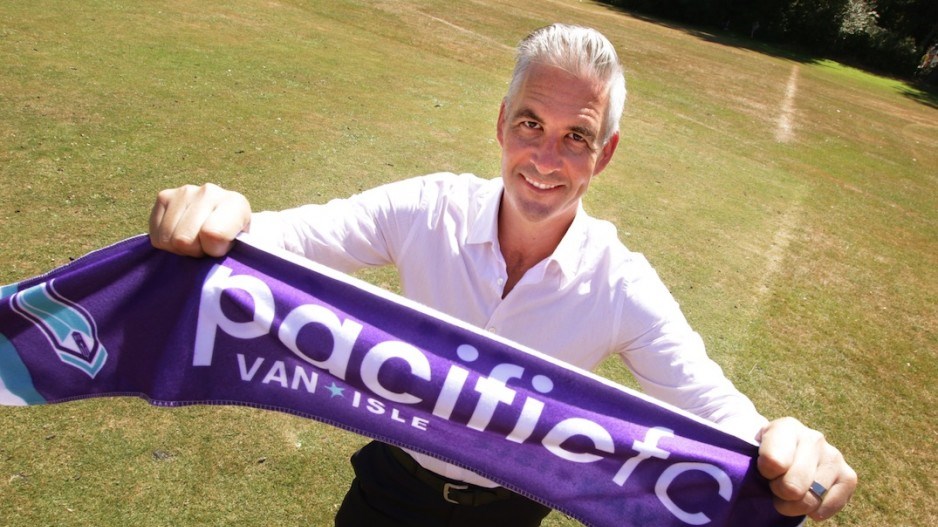A new professional soccer league that is readying to launch next spring has owners who are as eager to improve the calibre of Canada’s national soccer team as they are to turn a profit.
The Canadian Premier League (CPL) has confirmed seven teams so far, including one that has Vancouver-based owners and is readying to play its 14 home games, and some Canadian Championship games, in the Victoria suburb of Langford.
Other teams will be based in Calgary, Edmonton, Winnipeg, Hamilton, Metro Toronto and Halifax. An eighth team will likely be announced later this month to round out the league’s batch of inaugural franchises, commissioner David Clanachan told Business in Vancouver.
One league requirement is that at least 50% of all teams’ 22- or 23-man rosters be Canadian. Half of all players on the field must also be Canadian, Clanachan said.
With the average player salary likely to be around $40,000, the new league is intended to fill a gap whereby Canadian soccer players who are in their late teens or early 20s have a place to play professionally and develop if they do not get into Major League Soccer or any other professional league.
All Vancouver Whitecaps players are paid at least US$54,500, and the team’s highest-paid player, Kei Kamara, makes US$1 million.
“What many people don’t understand is that there is a lot of Canadian talent that drops off because there is no pathway,” Clanachan said.
Clanachan and entrepreneurs such as Langford’s Pacific FC co-owner Dean Shillington believe there is pent-up countrywide demand for affordable soccer games as family entertainment.
After all, they say, soccer is the world’s most-played sport, it has the highest participation rate among sports in Canada and the proliferation in streaming services has made it easier than ever for fans to follow soccer leagues worldwide.
The CPL has yet to sign TV-broadcast or streaming-service deals, but Clanachan said that is likely to come.
“We’ve had a tremendous amount of interest from non-traditional broadcasters and from the traditional broadcasters in Canada, which are Rogers [TSX:RCI.B] and Bell Media [TSX:BCE],” he said.
“The next generation is streaming far more than watching traditional broadcasting, so that landscape is changing.”
Some sponsors may come on board in part because the CPL has a partnership with Canada Soccer, and there could be opportunities to have brands at events featuring league teams and Canada’s national soccer team.
CPL team owners are required to ante up what Clanachan said is “more than $1 million” as an entry fee, and that investment also buys an equal stake in the league. All ownership groups also have to pass a financial stress test.
Shillington, who is president of Vancouver’s Knightsbridge Capital and an owner of Caffè Artigiano, has extensive experience as an entrepreneur and business owner. He is joined, as an equal-partner owner of Pacific FC, by Josh Simpson and Rob Friend, who each played professional soccer in Europe and for Canada’s national team.
“Investing in a sports team is not my MO,” Shillington said.
“I’m traditionally a very conservative investor. The businesses that I have are based on that premise, but the way this league has been structured, it is able to be viable on Day 1.”
He considered basing the team in a number of different B.C. communities and had discussions with representatives from cities such as Surrey.
The decision to go to Langford, however, was in part because the city was willing to renovate and expand its Westhills Stadium, by April, to accommodate more than 6,000 people. Ticket prices are likely to start in the $20 range.
If the anticipated fans flock to the venue for the games, Shillington said Langford has agreed to a second expansion to increase stadium seating to more than 10,000.
He may still invest in founding a team in Surrey, but that reality would depend in part on the success of the league and of his team in Langford.
Many details of the new league have yet to be finalized, including its salary cap for players. Shillington wants it to be less than $1 million. A separate salary cap would likely be in effect for coaching staff.
“We want all the clubs to have responsible owners and not have one go out and spend a lot of money to start an arms race of player signings,” he said.
“The key, as a business guy, is for this league to be around in 20 years, 50 years or 100 years. The owners have to be on the same page and to grow the league responsibly in time.” •




